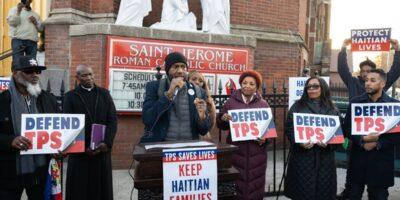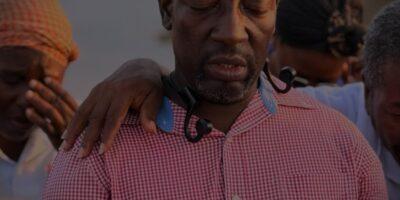This past weekend, Kenneth Cole opened a boutique in
Hey, on second thought, the
Here hoping that in the waning years of this administration, the propagandist arm of the Tèt Kale regime, in shoring up legacy points for the collective memory of an
Not only is Haiti open for business, but that boutique is the sounding horn of the raucous train of social progress speeding through the decaying city of
Haiti has long become something akin to an old, dusty vinyl record with a stuck needle, and the listener having to hear the same s**t over and over. But only, the listener never seems to get annoyed and enjoys the repetitiveness and sometimes even sings along.
Michel Martelly and Laurent Lamothe keep telling us Haiti is open for business, because open for business means investments, investments, investments. And investments, investments, investments mean jobs, jobs, jobs for millions of impoverished Haitians, who have all been promised that poverty will be done away with soon. Very soon.
Michel Martelly will probably be disappointed to learn that Haiti has been open for business since 1915 and that he’s hardly the first one to pioneer this foreign investment idea that he seems to hold so dear.
Vilbrun Guillaume Sam held just such ideas one hundred years before, and the post signs of history seem to suggest that the holding of such ideas was the harbinger of his demise: the population of
In learning of the downfall of their collaborator, Washington did not waste a breath. It cabled Admiral Caperton, whose ship, the U.S.S. Washington, had been poised off the shores of
Caperton ordered the landing of 330 US marines in
With the best military of the world at his disposal, Caperton proceeded to open the country for business. He seized all the customhouses of the island, leaving him in complete control of the country’s finances. That bad white dude even had power over the salaries of the Haitian government. Say a government official did not wish to sign a particularly treaty into law because he felt the law insulted Haiti’s sovereignty, then Caperton simply froze his salary until he ratified the damn treaty. Don’t believe me? Ask Sudre Dartiguenave, Pauleus Sannon, hell, ask the entire chamber of deputies of 1915.
An American financial adviser was appointed to play big daddy to the Haitian government; it could not spend a dime of its own monies without consulting with its big daddy .
And then, feeling that Haiti’s doors were not opened wide enough, because if you are open for business, your doors have to be wide open, (heck, forget open, they might as well tear them apart completely as to ensure they never close again!) they came across a particular article in the Haitian constitution explicitly barring foreigners to own land.
It would appear that Dessalines, dead for over 100 years, had the last laugh. He had been the architect of that article and by such maneuver, had managed to protect the black citizens of Haiti from the wretched jaws of an ever marching capitalism.
That article proved a dilemma to the Americans. How could Haiti be open for business with that
So they opted to dissolve that law by holding a mock plesbicite in which they forced Haitians to vote yes on amending the article.
Then you can bet the country was open for business my friend. Everyone and their mother wanted to come to Haiti and open a business.
Then came the grand promises of investments, of improving the economic life of the country, of improving the lives of the peasants, of doing away with poverty.
We heard such promises from the
It should be noted that history has been on repeat ever since, you know, that stuck needle on the vinyl, because Stephanie Vildrouin has been at the forefront of modernizing Ile-à-vache to make way for more hotels while vacating families from their lands with assurances that this is being done for them and for their tomorrows.
We have now been open for business for an entire century, waiting forlornly for the materialization of the grand promises of the Occupation. For one hundred years, we have been made destitute, left to starve, clinging on to vain hopes that foreign investments will improve our lot. Now, one hundred years later, with Caracol, Oasis, Best Western, sitting on lands which hold the rust and bones of our ancestors at their bosom, ancestors who passed on waiting to consume the fruits of the Occupation, we are again told that Haiti is open for business and that foreign investments will work miracles for Haiti.
I say we screw the doors back on their respective frames, lock them up and hand the keys to Dessalines.
.
Alain Martin







Comments